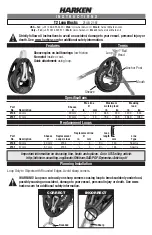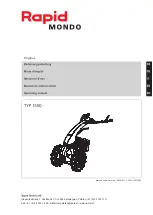
Uses and compatibility
1-7
biomarker discovery and proteomics applications, including protein
identification and characterization.
This system is optimized for high-resolution separations at precise nanoflow
rates. With closed-loop control, those rates range between 0.20 and
5.00 µL/min. With open-loop control and nanoACQUITY UPLC columns of
internal diameters ranging from 75 µm to 1 mm, the flow rates can extend to
100 µL/min. The column hardware and the matched outlet tubing can
withstand pressure of as much as 69,000 kPa (690 bar, 10,000 psi). The
column dimensions allow optimal MS-compatible flow rates, and matched
outlet tubing minimizes the effect of extra-column volume.
For further instruction, see the
nanoACQUITY UPLC System Operator’s
Guide
or
Controlling Contamination in LC/MS Systems
(part number
715001307). You can find these documents on http://www.waters.com; click
Services and Support > Support.
Non-ACQUITY devices for use with the Xevo TQD
The following non-ACQUITY
LC devices are validated for use with the Xevo
TQD:
•
Waters Alliance 2695 separations module
•
Waters Alliance 2795 separations module
•
Waters 2998 PDA detector
•
Waters 2487 UV detector
•
Waters 1525µ binary gradient pump + 2777 autosampler
•
Spark Holland Symbiosis™ system
Software and data system
MassLynx mass spectrometry software v4.1controls the mass spectrometer. It
is a high-performance application that acquires, analyzes, manages, and
distributes mass spectrometry, ultraviolet (UV), evaporative light scattering,
and analog data.
MassLynx software enables these major operations:
•
Configuring the system.
•
Creating LC and MS/MS methods that define operating parameters for a
run.
Summary of Contents for Xevo TQD
Page 12: ...xii...
Page 20: ...xx Table of Contents...
Page 23: ...Uses and compatibility 1 3 Xevo TQD TP03406...
Page 24: ...1 4 Specifications and Operating Modes Xevo TQD with visor up TP03407...
Page 42: ...1 22 Specifications and Operating Modes...
Page 52: ...2 10 Preparing for Operation...
Page 76: ...3 24 Changing the Mode of Operation...
Page 194: ...4 118 Maintenance Procedures...
Page 208: ...A 14 Safety Advisories...
Page 234: ...B 26 External Connections...
Page 238: ...C 4 Materials of Construction and Compliant Solvents...
Page 250: ...Index 8...
















































